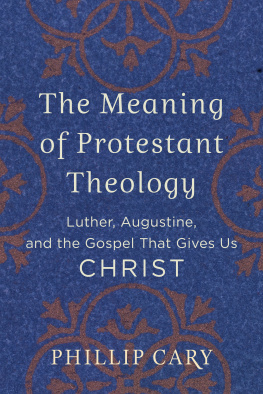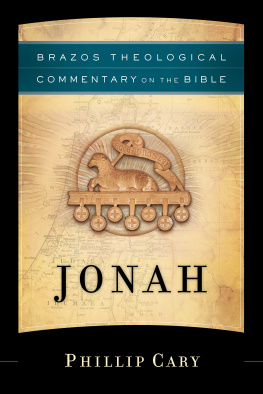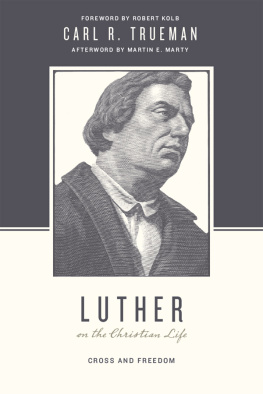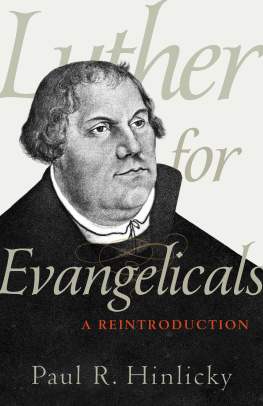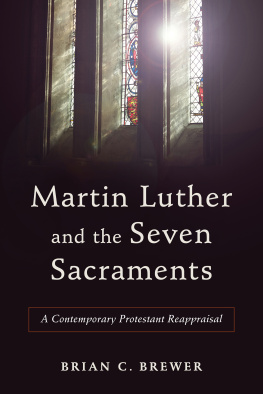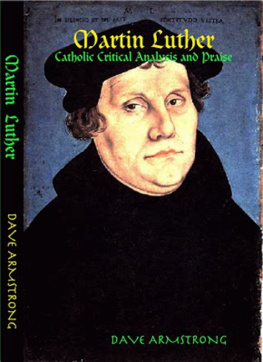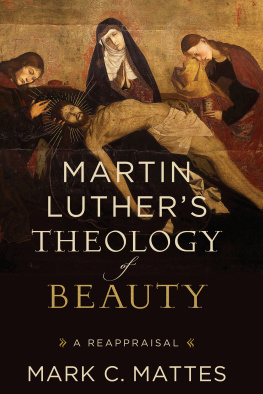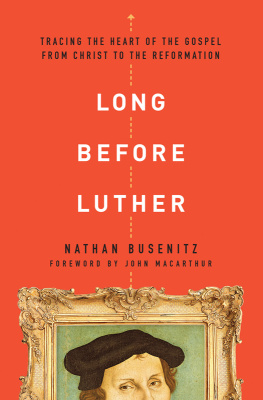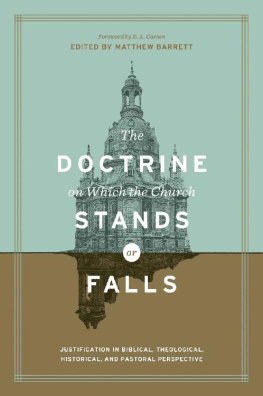1. Philosophical Spirituality
2. Divine Carnality
3. Christ the Mediator in Augustine
4. The Augustinian Journey and Its Anxieties
5. Young Luther: Justification as Penitential Process
6. Young Luther: Justification without Gospel
7. Luther the Reformer: Gospel as Sacramental Promise
8. Luther the Reformer: Gospel as Story That Gives Us Christ
9. Scripture: Demanding the Wrong Kind of Certainty
10. Salvation: Faith in Christs Promise Alone
12. Trinity: God Giving Himself in Person
A Note on Citations
I have done my best to make it possible for readers to locate the passages I cite from ancient, medieval, and Reformation texts, even when they use a different edition than I do. This makes for some abstruse citations at times, which I must explain.
I cite ancient writers either by standard pagination (noted in the margins of most editions of Plato and Aristotle, for example) or by book, chapter, and paragraph (as in Augustine, Confessions 7:10.16, which is book 7, chapter 10, paragraph 16). Whenever possible, I cite medieval and even modern writers the same way (for example, Locke, Essay , 4:16.13), and sometimes to avoid ambiguity I spell it out (for example, Anselm, Proslogion , chap. 1). Citations with only two numbers refer to book and chapter, except for Augustine, where they usually refer to chapter and paragraph in texts that consist of only one book (for example, Augustine, Teacher 11.38, refers to chapter and paragraph, respectively). The exception to the exception is Augustines City of God , which has only book and chapter numbers. It is useful also to note that some English translations of Augustine indicate only chapter or paragraph numbers, not both.
Letters, sermons, and orations, when they belong to a standard numbered collection, are cited in a similar manner. For example, Augustine, Letter 147:2.7 refers to the 147th letter in the standard collection of Augustines letters, second chapter, seventh paragraph. Augustine, Sermon 52:2 refers to the fifty-second sermon in the standard collection of his sermons (a different set of sermons from his sermon series on John or the Psalms), the second paragraph. (Augustines sermons, unlike his letters, dont have chapters.) Luthers sermons, on the other hand, are often cited by date or by their place in a collected edition, such as WA or Lenker (see below).
Like most scholars working on Plato, Aristotle, Augustine, or Luther, I use standard editions and anthologies that contain a multitude of writings between one set of covers. As a reader, however, I always want to know which particular work is being cited, not just which volume of a multivolume set it can be found in. Hence in the footnotes I have always given the name of the work to which I am referring or from which I am quoting. For works of Luther, whose development as a thinker I am tracing, I will often give the date when the work was originally published. For some works, such as the Galatians commentaries, the date has to be given every time, because the 1535 Galatians Commentary is an entirely different work from the 1519 Galatians Commentary.
Readers should be warned that the titles of Augustines treatises are rendered differently by different translators, which can easily cause confusion. I have used the titles indicated in the bibliography, but I have often translated the text directly from the Latin available at http://www.augustinus.it/latino, which gives the Patrologia Latina edition of Augustines complete works ( Opera Omnia ).
For Luther, I use the standard American edition, Luthers Works (abbreviated LW ), as well as the collection of Luthers church postil sermons edited by Lenker (which are by no means all of Luthers sermons). Often I have translated directly from Luthers Latin or German when a closer or more literal translation makes a point clearer, or when LW simply needs to be corrected. When I make my own translations of Luther, I refer first to the standard critical edition of Luthers works in the original languages, the Weimar Edition or Weimarer Ausgabe (abbreviated WA ), and then indicate in parentheses the corresponding passage in LW or Lenkers edition of the sermons, if there is one, like so: (= LW 34:170) or (= Luther, Sermons 1:190). Not all of Luthers works have been translated into English, however, so some references in WA have no corresponding reference in an English edition. Also, I sometimes use the LW translation but insert key phrases in the original language in brackets, like so: in hope [ in spe ]. In that case I cite LW first and then indicate the corresponding place in WA , like so: (= WA 56:269). Similarly, when I give the French or Latin for Calvin, I refer to the editions of his works given in the Corpus Reformatorum series (abbreviated CR ), like so: (= CR 33:438).
All italics in quotations are mine, added occasionally for emphasis but more often just to highlight the key phrases on which my interpretation turns.

